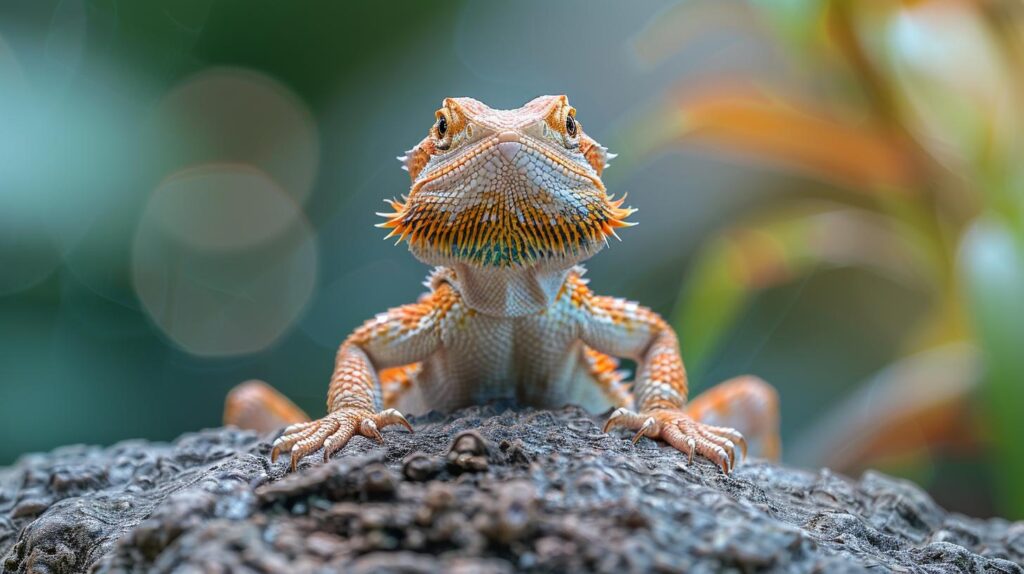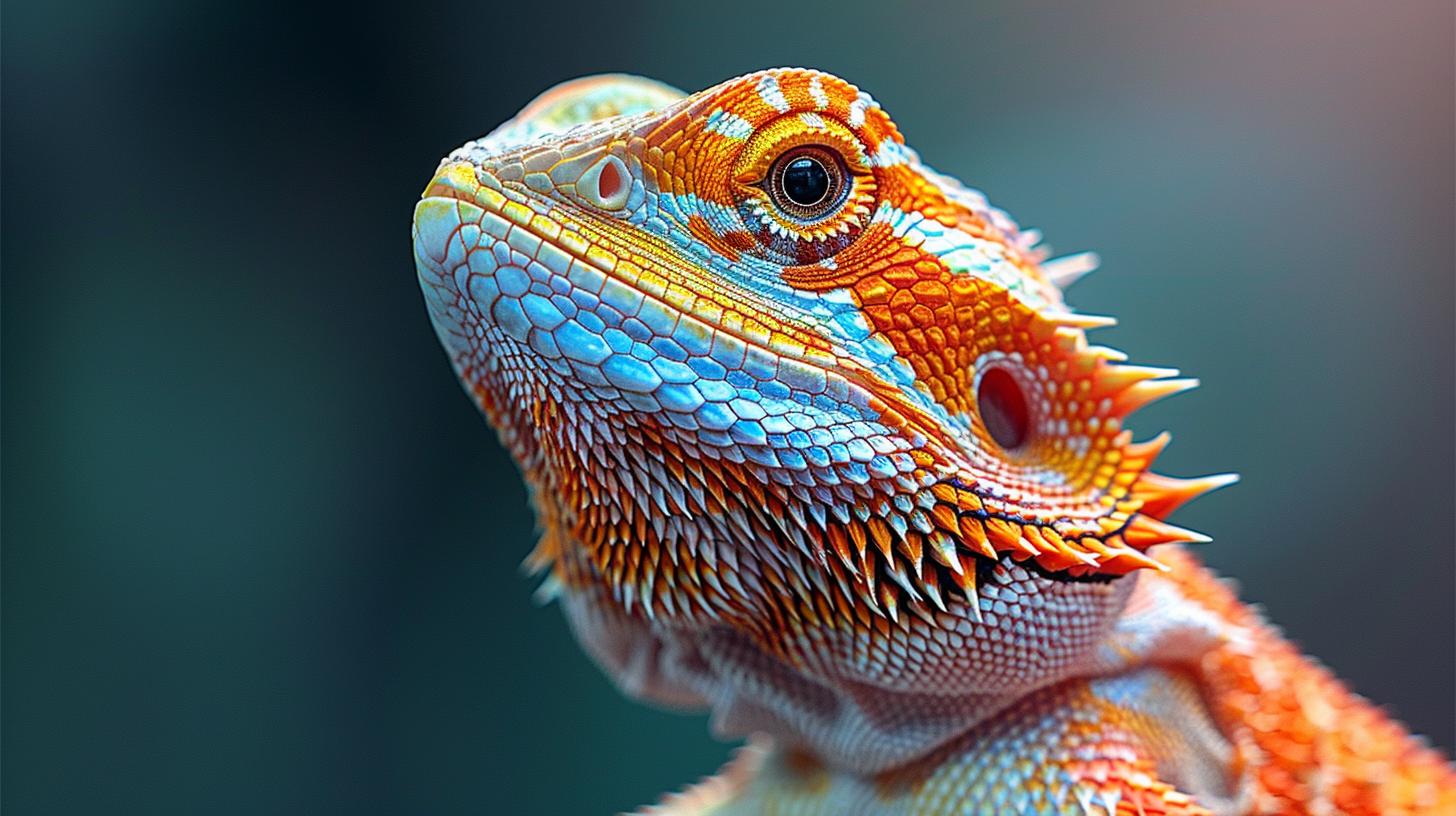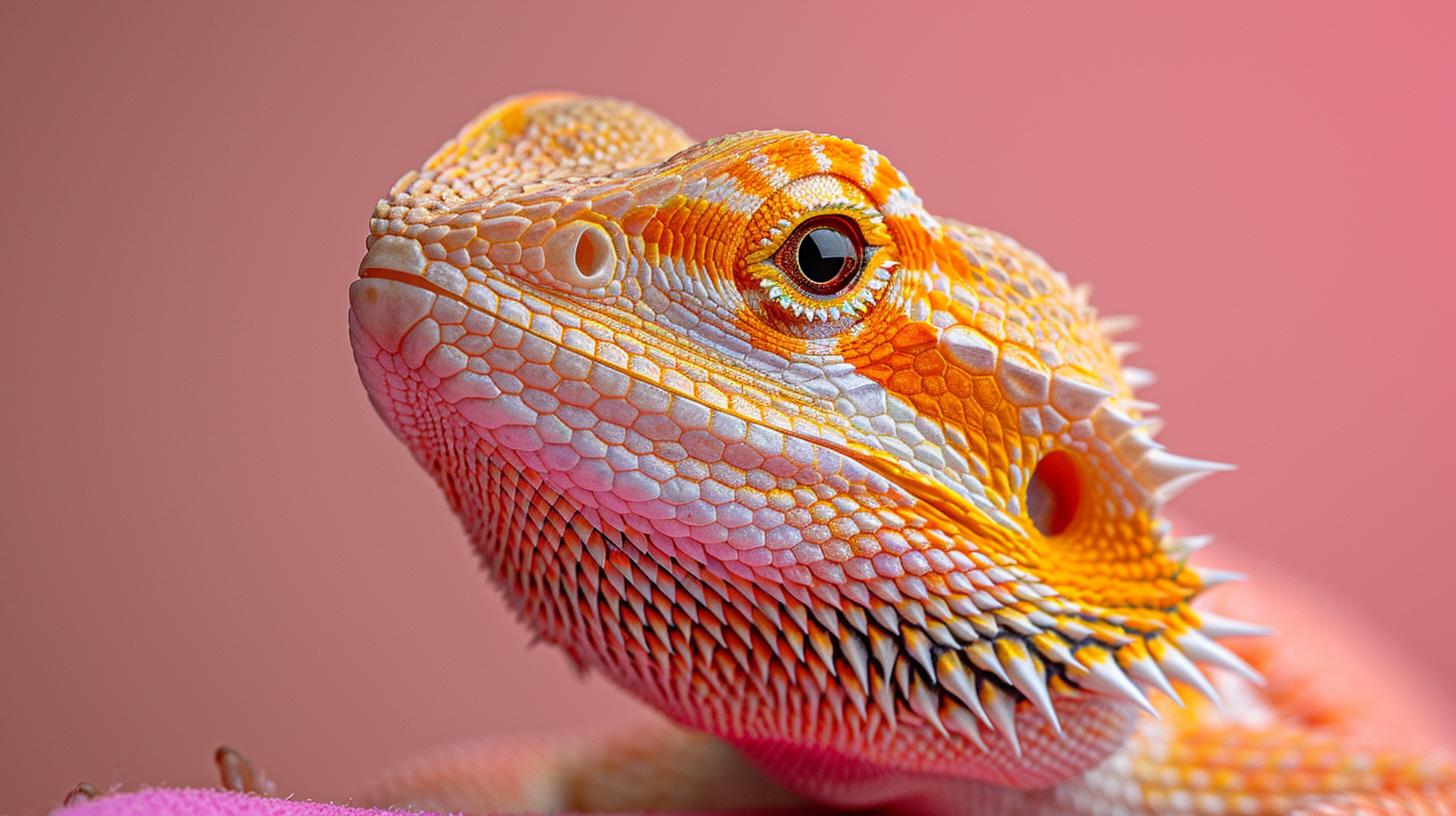Top 3 Bearded Dragon Feeding Schedules for Health

Unveiling the World of Bearded Dragons
Embarking on the journey of bearded dragon ownership transforms an ordinary pet experience into something extraordinary, especially when it comes to mastering bearded dragon nutrition These charismatic reptiles have surged in popularity, not just for their distinct appearance and friendly demeanor but also for the unique care they require.
Central to their well-being is a meticulously planned diet, a cornerstone that significantly influences their health and longevity. Understanding and implementing structured feeding schedules play a pivotal role in providing these reptilian companions with a nourishing lifestyle that echoes their natural dietary habits.
The quest for achieving a balanced diet underscores the multifaceted approach to bearded dragon care. At its core, this diet consists of an eclectic mix of insects, vegetables, and the occasional fruit treat, each contributing essential nutrients vital for a thriving life.
The concept of balanced diet serves as more than merely a guideline; it's a critical framework that defines the overall quality of life for these pets. A bearded dragon's diet shifts remarkably from the protein-heavy needs of juveniles to the plant-based preferences of adults, highlighting the significance of customization based on age and development stage.
Initial feeding schedules for juvenile bearded dragons emphasize frequent meals laden with protein-rich foods to support their rapid growth phase. The suggested regimen recommends diversifying food sources to ensure no nutrient is left behind. Moving on to adult bearded dragons, the narrative changes sharply.
This period marks a transition to schedules that cater to their slowed metabolism through increased vegetable intake and reduced feeding frequencies-striking a balance crucial for preventing obesity without compromising nutritional value. Tailoring diets becomes equally important as these dragons mature into their senior years, where adjustments are made to accommodate decreased activity levels while still warding off weight gain and other health issues.
Understanding how supplements such as calcium and vitamin D3 fit into each scheduled feeding introduces another layer of complexity in managing bearded dragon diets Their inclusion plays an indispensable role in preventing common nutritional deficiencies associated with captivity. This commitment to dietary excellence doesn't just reflect in healthier bearded dragons but cements a bond between pet and owner crafted through mindful care practices dedicated to sustaining vibrant lives through tailored nutrition plans.
The Significance of a Balanced Diet
| Nutrient | Importance |
|---|---|
| Proteins | Essential for growth and repair of tissues in juvenile bearded dragons. |
| Calcium | Vital for bone health and preventing metabolic issues. |
| Vitamins A, D3, and E | Support immune function, bone health, and prevent dietary deficiencies. |
Understanding *bearded dragon nutrition* is pivotal in maintaining the well-being of these reptiles. A balanced diet encompasses not only the right quantities but also a variety of food types that meet all nutritional needs.
Bearded dragons are omnivores; thus, their diet should include a blend of insects, vegetables, and on occasion, fruits to mimic their natural intake as closely as possible. Vegetables should form the bulk of their diet as adults, with insects being fed more sparingly compared to their juvenile phase.
Insects like crickets and mealworms provide necessary protein which is crucial during the younger stages for muscle growth and overall development. However, it's essential to ensure these protein sources are gut-loaded (fed nutrient-rich foods before being offered to your pet) to maximize their nutritional value.
On the flip side, vegetables such as leafy greens offer vitamins and minerals vital for health. It's advisable to introduce a varied vegetable palette to avoid selective feeding habits thereby ensuring they receive a spectrum of nutrients.
Fruits can be given sparingly due to their high sugar content which can lead to obesity if overfed. They should be considered more as treats rather than staple diet components. The specific ratio of these food groups will vary depending on the age and health condition of your bearded dragon-juvenile dragons require more protein for growth, whereas adults need a diet higher in vegetables to correspond with their lower metabolic rate.
Integrating supplements like calcium without vitamin D3 into the diet is also non-negotiable for preventing metabolic bone disease-a common ailment in captive bearded dragons due to insufficient UVB exposure from sunlight or inadequate artificial lighting setups. Ensuring that your bearded dragon receives direct sunlight or has access to high-quality UVB light within its enclosure is critical for metabolizing calcium properly.
This section highlights just how imperative understanding *bearded dragon nutrition* truly is-not only does it affect physical health directly by providing the building blocks for bodily functions but also plays a significant role in preventing diseases associated with nutritional deficiencies or imbalances.
Schedule 1
When it comes to the diet and nutrition of juvenile bearded dragons, understanding their unique needs is crucial for fostering optimal growth and health during these formative months. Unlike their adult counterparts, juvenile bearded dragons have a higher metabolism and consequently require more protein-rich meals to support their rapid development. An appropriate feeding schedule not only satisfies their increased energy demands but also lays the foundation for a healthy life ahead.
The feeding regimen for these young reptiles should reflect an understanding of bearded dragon nutrition, emphasizing a balance between animal-based proteins and plant-based nutrients. This period is critical in ensuring they receive all the essential vitamins and minerals necessary for strong bone development, muscle growth, and overall vitality. Caretakers need to be diligent in offering meals that are both nutrient-dense and varied to prevent nutritional deficiencies that can lead to long-term health issues.
High Protein Diet Necessity
For juvenile bearded dragons, the primary focus of their diet should lean heavily towards insect consumption. Foods like crickets, mealworms, and dubia roaches are excellent sources of the high-quality protein vital for their growth.

It's recommended that around 70-80% of their daily dietary intake consists of these insects, which closely mimics the diet they would have in the wild. To ensure thorough nutritional coverage, varying the types of insects fed to them throughout the week can help provide a wide spectrum of essential nutrients.
Vegetable Integration
Although a smaller portion of their diet at this stage, incorporating vegetables early on encourages healthy eating habits as they mature. Vegetables such as kale, collards, and shredded carrots should make up about 20-30% of their total food consumption. These not only offer crucial vitamins but also introduce fiber into their diet which aids in digestion-a foundational aspect important for preventing common gastrointestinal issues in reptiles.
Feeding Frequency
The metabolism of juvenile bearded dragons is notably fast-paced, dictating a need for frequent feedings throughout the day. Typically, offering meals three times daily ensures they're receiving ample opportunity to take in necessary calories for growth without overburdening their digestive system.
Each feeding session should last around 10-15 minutes, allowing them enough time to eat their fill while monitoring for any signs of overeating or underfeeding. As they edge closer towards adulthood, gradually reducing feeding frequency helps ease their transition into dietary requirements fitting an adult bearded dragon.
By adhering to these guidelines within Schedule 1: For Juvenile Bearded Dragons, caretakers can significantly influence the health trajectory of these pets. Incorporating a balanced approach to both protein and vegetable intake alongside appropriate supplements guarantees a diversified diet enriched with everything necessary for their wellbeing during this rapid phase of growth.
Adapting to Adult Needs
As bearded dragons transition from the energetic growth phase of their juvenile years into adulthood, their dietary needs undergo significant changes. This period in a dragon's life requires a careful recalibration of their feeding schedule to accommodate a slower metabolism and different nutritional requirements.
Adult bearded dragons, typically recognized from the age of 18 months onwards, begin to show less interest in frequent meals consisting heavily of protein and gradually move towards a diet that places more emphasis on plant-based nutrition. Understanding and implementing an appropriate feeding schedule for adult bearded dragons is paramount to maintaining their health and vitality.
The Ideal Balance for Adult Dragons
For an adult bearded dragon, achieving the right balance between plant-based foods and proteins becomes crucial for sustaining optimal health. At this stage, a drastic reduction in the number of insects offered is recommended, with a shift towards vegetables making up the bulk of their diet. A healthy adult bearded dragon's diet should consist of approximately 75% vegetables and 25% proteins from live insects.
This balance not only contributes to maintaining an appropriate weight but also ensures the intake of bearded dragon nutrition necessary for their well-being. Staples such as collard greens, bell peppers, and squash should become regulars in their meal plan alongside staple feeder insects like crickets or dubia roaches.
Frequency and Portion Control
Besides what to feed, knowing how often and how much to feed an adult bearded dragon is vital. Given their reduced metabolic rate compared to their younger selves, adult dragons do not require daily feedings of live insects. Offering live prey items 2-3 times per week suffices to meet their protein needs without risking obesity.
On these feeding days, portion control should be exercised by limiting insect consumption to what can be consumed within a 10-15 minute timeframe. As for vegetables, these can-and indeed should-be offered daily to ensure constant access to essential nutrients and hydration through fresh produce.
In adjusting your pet's diet to align with these guidelines for adult bearded dragons, you play a pivotal role in promoting a long-lasting state of health and reducing the risk of common issues associated with improper nutrition such as obesity or vitamin deficiencies.
Through thoughtful consideration towards both the quality and quantity of food provided in accordance with this schedule, you support not just their physical health but also contribute significantly towards enriching your pet's life during its mature years.
Schedule 3
As bearded dragons age, their metabolism slows down significantly, necessitating a shift in their dietary habits to maintain optimal health. This critical period in a bearded dragon's life calls for a tailored approach to bearded dragon nutrition that focuses on preventing obesity while ensuring that all necessary nutrients are provided. A feeding schedule for senior dragons should prioritize low-calorie but nutrient-rich vegetables and fewer insects than what would typically be fed to younger dragons.
For an aged bearded dragon, consider the following feeding regimen:
- Vegetables: Offer a variety of fresh vegetables such as collard greens, bell peppers, and squash daily. These should form the bulk of the diet.
- Insects: Feed protein sources like crickets or dubia roaches two to three times per week instead of daily. It's essential to choose smaller-sized insects to prevent choking and aid in digestion.
- Fruits: Introduce fruits sparingly as treats due to their high sugar content. Berries and chopped apples can be given once or twice a month for variety.
Supplementing with calcium and vitamin D3 remains vital for bone health, especially as the risk of metabolic bone disease increases with age. However, senior dragons may require these supplements less frequently compared to their juvenile counterparts; consulting with a reptile veterinarian will help determine the right schedule based on individual health assessments.
Adjusting portion sizes is also crucial for managing weight in senior bearded dragons. Overfeeding can lead to significant health issues at this age, so closely monitor your pet's condition and adjust portions as needed. Remember, maintaining hydration is equally important; hence regular access to fresh water through both drinking and bathing should continue as part of their routine care.

Emphasizing suitable food selection, proper supplementation, and vigilant portion control helps ensure that our senior dragons can enjoy their elder years in comfort and good health. Providing care tailored specifically toward age-related changes reflects our commitment not only to meeting immediate nutritional needs but also to promoting longevity and quality of life for these beloved pets.
The Role of Supplements
The nutritional landscape for bearded dragons is robust, yet it demands meticulous attention to detail. Among the critical components of bearded dragon nutrition are vitamins and minerals, particularly calcium and vitamin D3.
These elements are not mere additions to their diet; they are vital for preventing metabolic bone disease (MBD), a common and severe health issue in bearded dragons resulting from nutritional deficiencies. Calcium plays a pivotal role in supporting bone health and muscular function, while vitamin D3 aids in calcium absorption, ensuring it is effectively utilized by the body.
Incorporating supplements into your bearded dragon's diet requires a strategic approach to avoid over or under-supplementation. Here's a simple guide on how to supplement efficiently:
- Calcium: Dust the feeder insects with a high-quality calcium powder without vitamin D3 two to three times per week for adults, and every other feeding for juveniles.
- Vitamin D3: Given its synergy with calcium, provide a calcium supplement that contains vitamin D3 at least once a week if your bearded dragon does not have regular exposure to UVB light from either natural sunlight or artificial lighting.
However, one aspect often overlooked in *bearded dragon* care is the risk of hypervitaminosis D (an excess of vitamin D) which can cause as much harm as its deficiency. To mitigate this risk:
- Ensure an optimal cycle of UVB light exposure appropriate for their age and developmental stage.
- Balance dietary inputs with both natural food sources rich in these nutrients and commercial supplements.
- Regular consultations with a vet who specializes in reptile care can guide personalized supplementation plans based on specific health needs.
Understanding how each nutrient interacts within your pet's system underscores the complexity yet importance of managing their dietary intake closely. The interplay between supplements and natural food sources catalyzes a better absorption rate of key nutrients essential for growth, development, and longevity.
As we progress into feeding schedules tailored to different life stages of *bearded dragons*, remembering the cornerstone role of supplements is fundamental. Not only do they aid in preventing diseases like MBD, but they also enhance overall health, preparing them for each dietary transition smoothly. Stay tuned as we delve deeper into creating effective feeding regimes that cater specifically to maintaining optimal health through carefully chosen diets and supplementary strategies.
Maintaining Your Bearded Dragon’s Health Through Diet
In conclusion, understanding the unique dietary needs of your bearded dragon is paramount to ensuring their long-term health and vitality. Through this piece, we have navigated the complex world of bearded dragon nutrition, spotlighting the pivotal role that a carefully structured feeding schedule plays in catering to these needs.
From the enthusiastic appetite of juvenile dragons to the more measured dietary demands of their senior counterparts, each phase of a bearded dragon's life requires a nuanced approach to nutrition. Adhering to these guidelines not only supports their physical well-being but also fosters a bond between pet and owner.
The journey towards optimal bearded dragon health is multifaceted, incorporating a balance of proteins, vegetables, and occasional fruits alongside essential supplements like calcium and vitamin D3. This comprehensive strategy is not just about fulfilling nutritional requirements; it's an act of care that enhances the quality of life for these beloved pets. Regularly updating oneself on the best practices for bearded dragon care can make a significant difference in preventing common health issues related to poor diet.
We invite you to continue enhancing your knowledge and passion for pet care by exploring more articles within our website. Whether you're looking for advanced insights into reptile care or actionable tips on nurturing other pets, our library is crafted with dedication and editorial excellence to meet your needs. Discover more ways to ensure your pet thrives under your loving care - because at the end of the day, their health and happiness are what truly matter.
Frequently Asked Questions
What Nutrients Does a Bearded Dragon Need?
Bearded dragons require a balanced diet rich in calcium, phosphorus, vitamins A and D, and protein for optimal health. Calcium is crucial to prevent metabolic bone disease, while the correct ratio of calcium to phosphorus (around 2:1) supports proper nutrient absorption.
Vitamins A and D are important for skin health and calcium metabolism, respectively. Adequate protein intake is necessary for growth, especially in younger dragons.
What Is the Healthiest Food for Bearded Dragons?
The healthiest food for bearded dragons includes a mix of leafy greens such as collard greens, turnip greens, and dandelion leaves, combined with vegetables like squash and sweet potatoes. Insects like crickets and Dubai roaches can also be offered as they provide essential proteins. Variety in their diet mimics their natural habitat's diversity, contributing to overall well-being.
What Should You Not Feed Bearded Dragons?
You should avoid feeding bearded dragons avocados and rhubarb as these foods are toxic to them. Also on the list are onions, garlic, spinach (due to high oxalate content which inhibits calcium absorption), iceberg lettuce (lacks nutritional value), and insects caught in the wild or from bait shops due to potential pesticide exposure and parasites.
Why Are Bananas Good for Bearded Dragons?
Bananas can be beneficial for bearded dragons when fed in moderation due to their potassium content along with other vitamins and minerals that support health. However, bananas have a high phosphorus-to-calcium ratio which can hinder calcium absorption if fed too often, therefore they should only be offered as an occasional treat.
Why Can't Bearded Dragons Eat Lettuce?
Lettuce, specifically iceberg lettuce, offers minimal nutritional value and consists mainly of water which can lead to diarrhea if consumed in large quantities by bearded dragons. This may result in dehydration over time despite the high water content initially provided by the lettuce. Nutrient-rich alternatives should always take precedence over lettuce in a bearded dragon's diet.
Leave a Reply
You must be logged in to post a comment.